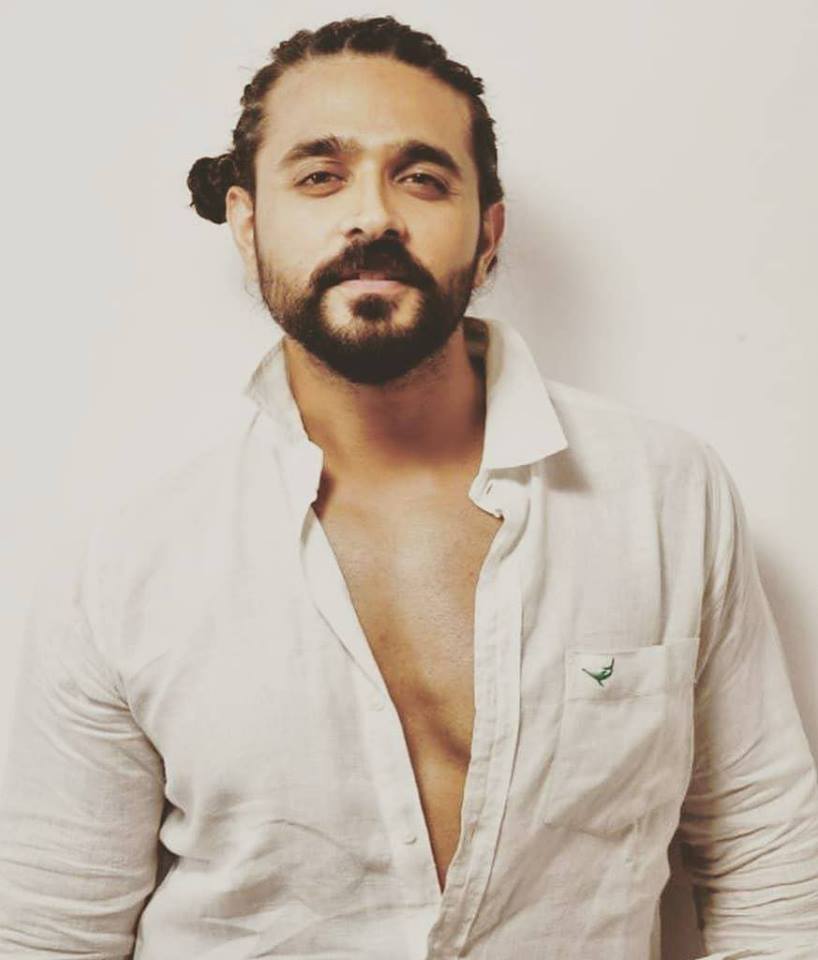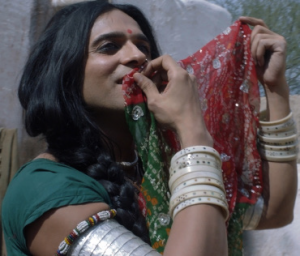
By: LekshmiSajeev
VERSATILE ACTOR ASHISH SHARMA ON PLAYING A TRANSPERSON IN BOLD NEW MOVIE
by MOHNISH SINGH
Chameleon-like actor Ashish Sharma has effortlessly transformed himself into dramatically different characters in diverse projects.
The sought-after star has done that again for the film Khejdi. He has taken on perhaps the most challenging role of his career in a film inspired by short story Sanjha and portrays a woman trapped in a man’s body.
Ashish has also produced the film, which has been to several international film festivals and is trying to overcome obstacles to get it a proper release.
The popular actor, who has regularly featured highly in Eastern Eye’s list of 50 Sexiest Asian Men, spoke about Khejdi, the inspiration behind the film, preparation that went into playing a transgender person and upcoming projects.
Tell us about your film Khejdi?
Khejdi is actually based on a short story called Sanjha that I read some six or seven years ago. My father gave it to me. It was a short story written by Kiran Singh and published in a Hindi magazine. I read the story and it stayed with me. I shared the story with my wife, Archana (Taide). When she read it, she also had the same feeling. Since there was this rough screenplay already running in my head, she suggested this should be my first film as a producer. So, that’s how the seed was sown.
What can you tell us about the story?
It is a beautiful story about a transgender person. For the first time, I saw a story from a transperson’s point of view. Usually, the LGBTQI-themed stories we see in our cinema are from our point of view or from society’s point of view. There is this projected image of transgenders, which is shown in cinema, but that is not the actual case. They are taught to behave in a certain way. If it is not taught to them in that particular way and if they do not grow up like that, I think they will be just like us. So, that’s what the film is all about.
What was it like venturing into film production?
I was planning to get into film production and had already done a lot of production for six years. We have produced many online campaigns, a web series and a regional show for Zee TV in Rajasthan. With Khejdi, we ventured into film production for the first time and that was all Archana’s idea. She took care of things completely as I did not have the temperament or the brains. She is a multi-tasker and can handle everything on her own. She is very street-smart and was ready for a full-fledged film production. Also, the story that we got in our hands was so compelling that it pushed us to enter into this, and I think we pulled it off nicely.

You play a transgender in Khejdi. Was it difficult for you to get into the psyche of a transgender person?
It was very difficult. I gave up a couple of times. I was literally crying and howling by the tenth day of my workshop. I did a workshop with Yash Raj sir who plays my father’s character in the film. Both he and Archana consoled me. They asked me to give it some time and convinced me I’ll be able to do it. So it took me three months to break that mould and get into this character. Plus, I did not have any reference point. I had to create everything from scratch and the biggest hurdle was that it was not a transgender point of view; it was just a female’s point of view and that I had no reference to.
I couldn’t feel how it would be to be trapped in a male’s body or in physicality. It is not even a man’s body, it is an intersex. She is an intersex, but the physicality is manly and inside, she is brought up as a girl. So that was very contradictory and complex. So to get that right was gruelling for me. I learned kathak for physicality and lost around 25 kg of weight. Everything was difficult, but, ultimately, everything fell into place.
Did you not meet any transgender person as part of your preparation?
No and it was done on purpose. The story does not talk about transgender’s point of view. The story is not from our point of view or from society’s point of view or how we see them. The story is not about a projected image that we see. The story is about a human being who is in a house trapped and brought up as a girl. So, we and director Rohit Trivedi made a deliberate decision that we would not meet or talk to any community or spend time with them because I might get influenced by that projected image.
As of now, the film is being released only in Thailand, but not in India despite the huge popularity of TV actors…
Nobody is releasing the film for us in India. It’s not like we don’t want it to be released in India. So, that is our fight. The movie is based in rural India, which tells a story rooted in Indian culture. The irony is that people from outside India are accepting it, while people in our country are not. There are so many films made on these subjects, but they only talked about a projected image. They have catered to that popular stereotypical image. Having said that, there have also been some sensible movies made on not just transgenders, but the whole LGBTQI umbrella. Those films also did not get that much exposure or a proper release.
Why is that?
There is a certain prejudice towards the content and subject. Outside India, there is a lot of acceptance and people are ready to watch such films. I had German and North American premieres, and people loved the film there. There are overseas companies that watch a film, pick it up and decide to do a theatrical release in their own country because they find it relevant and the kind of story that can make money. I understand that commercial movies work differently here. But then there need to be some platforms for content like this where audiences can watch this kind of cinema and provide support so that more films are made on such topics. People don’t attempt it because they know nothing will happen in return, which is true. We have such good stories but we don’t make an effort to share them because of various factors.
Do you think the scenario is changing a bit because lots of stories like this are coming up on digital platforms and people are accepting them?
Exactly, there is definitely a lot of acceptance and openness because the platform gives you that freedom to tell these stories the way you want to tell them. So, I think, you are right and that is our idea also. After the Thailand release, we are going to bring it on to one of the digital platforms because it reaches to a wider audience. You know, theatres still somewhere, down the line, curb the limit. So, I think, yes, it’s a good space to win as a maker, as an actor and as a technician.
With you venturing into films and the digital space, is television going to take a back seat?
No, because, I think, today all the barriers are broken. Everybody is working everywhere. You can see film stars on TV and on the web. I think it is a wonderful space to be in right now. So wherever you find a good story and think you can add to it, and the story adds something to you, you go and work. I think that’s also my motto right now. I take my time to decide what TV show I want to take up. I think television makers have understood that if they have to come to Ashish Sharma, it better be something very good. Right now, I don’t have any exciting offer from television, but if anything comes my way, why not?
Your last show Prthivi Vallabh did not click with the audience despite being mounted on a huge scale. Did it hurt when it was pulled off-air midway?
As an actor, my experience working on the show was good. I did and got what I wanted from the show. The show, however, did not get what it deserved. But, over a period of time, working in the TV industry, you get used to such things and they stop affecting you. No point troubling yourself on things out of your reach and control. So whatever I could do for the show and could add, I did my best. Whatever the show could give me as an actor, it gave me. It gave me very good experience, really good people to work with and a scope to perform on various levels, so I was happy. Yes, I think, overall it would be saddening for the makers because they lost a lot of money. It is disheartening to see them like this because we know internally how much effort it took to make such a huge show. I have not seen that scale on television and no one has matched that scale.
What is next?
I’m working on two interesting things right now, in our production only. There are two scripts. One is a horror franchise that will start production by the last quarter of this year and the other is a satirical comedy. So, yeah, right now, a lot of things are happening.
